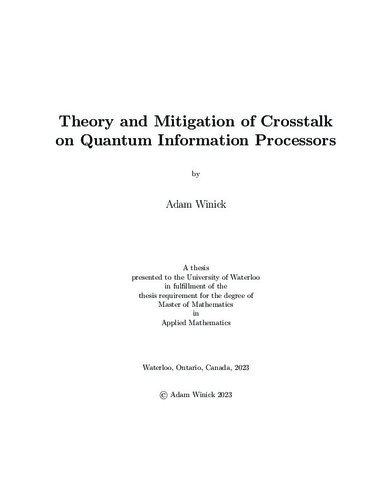| dc.description.abstract | Successfully implementing large-scale quantum computation has proven to be an exceptionally arduous task. Decoherence and imperfect control limit the coherent manipulation of large ensembles of particles. While quantum error correction provides robust schemes for executing quantum algorithms on error-prone systems, the methods usually assume that the errors are well-behaved and lie below some threshold. The burden of QEC can be substantial, and reaching error rates well below these thresholds can dramatically improve the processing capabilities of a device.
A hierarchy of error processes exists with increasingly desirable properties at the cost of realism and generality. For example, quantum circuits subject to Markovian errors typically have higher error thresholds than those under general errors. We can further divide Markovian errors into coherent and incoherent processes, with the former having much lower thresholds.
This thesis examines crosstalk, a type of coherent error process, and mainly studies its role in superconducting quantum computing devices.
The first part of our work details a systematic framework for modeling crosstalk that occurs during the operation of a quantum computer, i.e., what happens on the device while performing gates. We break this crosstalk down into local and nonlocal effects. We show how to model local crosstalk on a digital computer without approximations efficiently. Unlike local crosstalk, nonlocal crosstalk cannot be modeled efficiently on a digital computer without approximations. Thus, we develop a framework for approximating the effect of nonlocal crosstalk. We observed a negligible difference between our approximation and the exact system dynamics in typical systems.
The second part of this thesis details our attempts to characterize and efficiently mitigate crosstalk on fixed-frequency superconducting qubits experimentally. The first obstacle we encountered was learning the crosstalk affecting a system. When the crosstalk is weak, existing methods prove difficult, so we developed a new approach to measure crosstalk. The second problem we needed to address was verifying that our model was correct. Using the results from our first measurements, we compare predicted evolutions with experimental data in a setting much different than the measurement procedure. We see excellent agreement between experiment and theory, indicating the model is reasonable. The last outstanding puzzle piece in this investigation is using this model to mitigate crosstalk, and our research is ongoing. | en |

